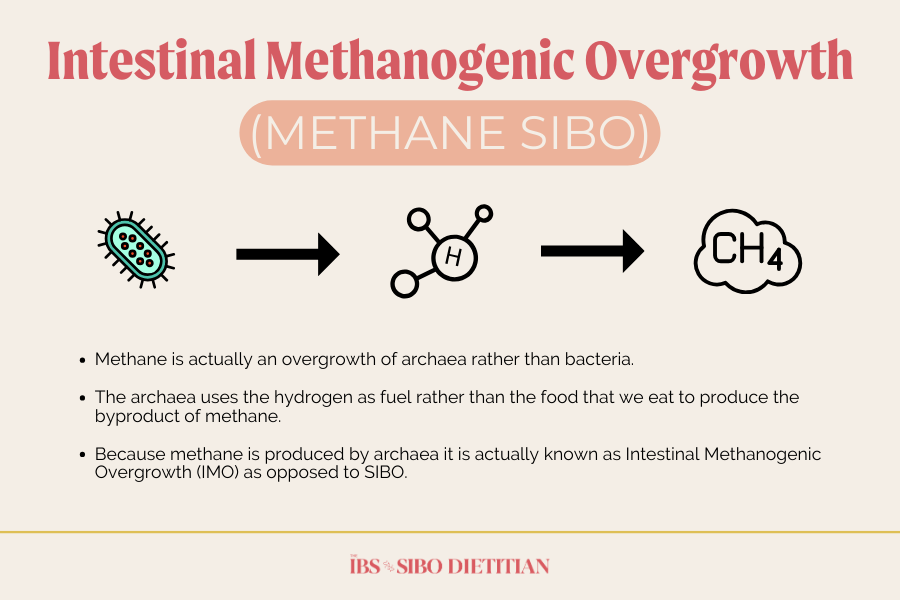What is Methane SIBO?
Methane SIBO or Intestinal methanogen overgrowth (IMO) refers to an excessive build up of methanogenic archaea in the gastrointestinal (GI) tract. This can either reside in the small or large intestines. (1)
Methanogens are microorganisms that produce methane gas as a byproduct of their metabolism. While they are normally present in the gut in small quantities, an overgrowth, can lead to slowered gut motility and many unwanted symptoms. (1,2)
Overview of the Microbiome and GI Tract
To fully understand the impact of methane SIBO, one must first grasp the image of a normal bowel.
Large Intestine
Under normal circumstances, the lower GI tract (large intestines), hosts a diverse array of microorganisms, including bacteria, archaea, fungi, and viruses. This diverse community, known as the gut microbiome, performs essential functions such as aiding in digestion, synthesizing vitamins, and supporting the immune system.
A healthy gut microbiome is characterized by a balanced composition, with beneficial bacteria outnumbering potentially harmful ones. The presence of beneficial bacteria like Bifidobacteria and Lactobacillus helps maintain the integrity of the intestinal barrier and suppresses the growth of pathogenic organisms. (2)
Small Intestine
While the small intestine is not completely devoid of bacteria, the bacterial population is relatively low and considered sterile compared to the colon.
When SIBO and/or methane SIBO (IMO) is present however, there is a significant increase in the number and diversity of bacteria and archaea, repectively, exceeding the normal levels. This overgrowth of bacteria and archaea are fermented, with the byproduct being gases as opposed to the beneficial byproducts of the large intestine. (1)
Relationship between Methane SIBO and Other Variations
There are three variations of intestinal overgrowth: Hydrogen dominant SIBO, Methane dominant SIBO (IMO), and Hydrogen Sulfide dominant SIBO. (1,2) These three gases present differently but do not act independently.

- Hydrogen (H2): Produced by various bacteria during carbohydrate fermentation, hydrogen is an essential component of gut gas production. Excessive hydrogen production can occur in conditions like carbohydrate malabsorption, leading to symptoms such as bloating and flatulence.
- Methane (CH4): Methanogenic archaea, specifically Methanobrevibacter smithii, convert hydrogen and carbon dioxide into methane. (3) In small quantities, methane is harmless, but excessive methane production can lead to intestinal methanogen overgrowth. Methane is a consuming gas, meaning it is utilizing hydrogen as fuel instead of bacteria.
- Hydrogen Sulfide (H2S): Produced by sulfate-reducing bacteria in the gut, hydrogen sulfide is a highly toxic gas. Hydrogen sulfide competes with Methane for the consumption of Hydrogen. (3) While low levels of hydrogen sulfide play a role in cellular signaling and vascular function, excessive production can lead to gastrointestinal symptoms such as diarrhea and abdominal pain.
Signs & Symptoms of Methane SIBO
- Constipation: Excessive methane production can slow down gut transit time, leading to difficulty in passing stools and infrequent bowel movements.
- Abdominal Bloating and Discomfort (2) – Bloating, cramping, and discomfort in the abdominal region are common symptoms associated with methane SIBO (IMO).
- Weight Gain – Weight gain and higher BMI has been associated with methane SIBO and is an exclusive symptom to this gas. (2,4)
- Flatulence: Excessive methane production can lead to increased flatulence, contributing to bloating and discomfort.
- Fatigue: Chronic gastrointestinal symptoms can affect nutrient absorption and overall energy levels, leading to fatigue and malaise. (1,2)
The Bottom Line
Methane SIBO (Intestinal methanogen overgrowth) disrupts the delicate microbiome balance, leading to gastrointestinal symptoms such as constipation, abdominal discomfort, and altered bowel habits. Understanding the differences and connections of hydrogen, methane, and hydrogen sulfide in gut health, along with proper testing, can help properly diagnose intestinal overgrowth.
Other Posts to Dig Into
Low FODMAP Protein Powder: Which Should You Choose?

March 2, 2024
Katrina Cox MS, RDN
Leave a Reply
If you are bloated everyday and cannot pinpoint why, take this quiz to get more insight on what could be happening!
I was positive for hydrogen and methane
Unfortunately that is very common! The Hydrogen feeds off of the bacteria and then archaea feeds of the Hydrogen.